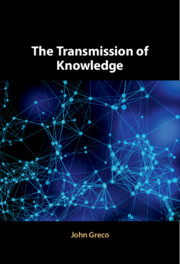Book contents
- The Transmission of Knowledge
- The Transmission of Knowledge
- Copyright page
- Contents
- Preface
- Acknowledgments
- 1 Introduction
- 2 The Framework Presented
- 3 Joint Agency and the Role of Trust in Testimonial Knowledge
- 4 Social Norms and Social Sensibilities
- 5 A Unified Account of Generation and Transmission
- 6 The Framework Extended
- 7 Education and the Transmission of Understanding
- 8 Reductionism and Big Science
- 9 Social Religious Epistemology
- Appendix: The Garbage Problem
- Bibliography
- Index
5 - A Unified Account of Generation and Transmission
Published online by Cambridge University Press: 21 August 2020
- The Transmission of Knowledge
- The Transmission of Knowledge
- Copyright page
- Contents
- Preface
- Acknowledgments
- 1 Introduction
- 2 The Framework Presented
- 3 Joint Agency and the Role of Trust in Testimonial Knowledge
- 4 Social Norms and Social Sensibilities
- 5 A Unified Account of Generation and Transmission
- 6 The Framework Extended
- 7 Education and the Transmission of Understanding
- 8 Reductionism and Big Science
- 9 Social Religious Epistemology
- Appendix: The Garbage Problem
- Bibliography
- Index
Summary
Chapter 5 argues that the information economy framework can be wedded to a virtue-theoretic epistemology so as to yield a unified account of knowledge generation and knowledge transmission. The argument begins with the familiar virtue-theoretic idea that knowledge is a kind of success from virtuous or competent agency, as opposed to a mere lucky success.Knowledge is an achievement in that sense. But now we draw a distinction between the competent agency of an individual and the competent joint agency of two individuals acting together. The argument, then, is that knowledge generation is to be understood in terms of success due to the competent agency of the knower. Knowledge transmission is to be understood in terms of success due to the competent joint agency of speaker and hearer acting together. The same argument is used to address the most persistent and pressing objection to virtue epistemology – that it cannot give an adequate account of testimonial knowledge, and that, more generally, virtue epistemology is overly individualistic.
Keywords
- Type
- Chapter
- Information
- The Transmission of Knowledge , pp. 87 - 102Publisher: Cambridge University PressPrint publication year: 2020

